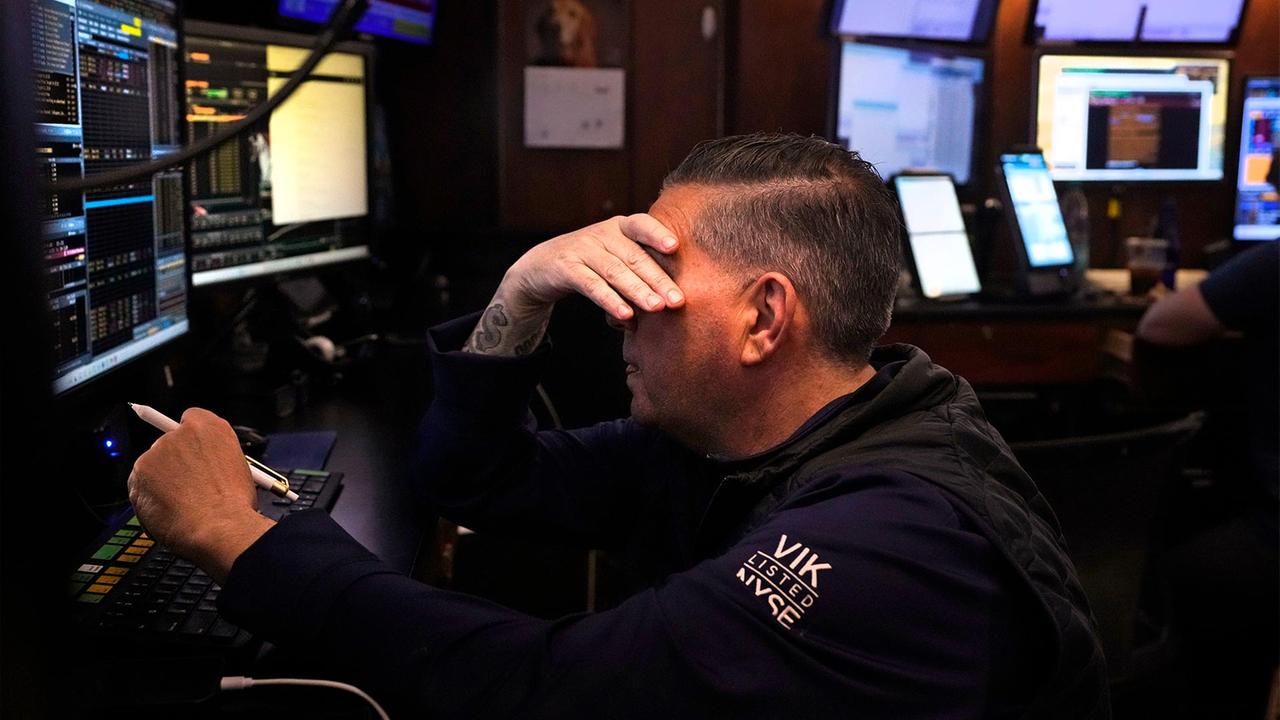market report
The US exchanges were also all about the longest of the Trump government. Because the consequences of customs policy against the rest of the world seem to be increasingly unpredictable.
The US exchanges were also all about what happened on the world exchanges. Even if higher losses were initially limited in the course, the mood on Wall Street remains extremely tense. The leading index Dow Jones in the end lost 0.91 percent to 37,965 points after it had already given in over four percent in the early shop. The index moved in a bandwidth between 36,611 and 39,207 points, a range of around 2,500 points.
In the end, the S&P 500 Index went out of retail at 5,062 points by 0.23 percent. The Nasdaq technology agency also fluctuated strongly and even ended slightly at 0.1 percent. The NASDAQ 100 selection index won 0.2 percent to 17,430 percent. In view of the high losses, however, there was no question of a strong counter -movement.
The losses at the start of the new week were less than last, but experts warned for caution. “What we see is a technical recovery after a very steep sale, but it is not necessarily the end of the sale,” said Fiona Cincotta, chief legisin at the Broker City Index.
“In order for this to happen, fundamental changes would have to take place.” This will be the case, for example, if Trump takes out a few tariffs if the central banks supported or if investors get the impression that the global economy is good despite the tariffs.
Industrial representatives also criticized the government's customs policy. The head of the largest US bank JPmorgan Chase, Jamie Dimon, today warned of the shareholders of growth brake and increasing inflation in his annual letter. Dimon is the longest reigning boss of a large Wall Street company.
He warned of “uncertainties” by Trump's customs policy. This included falling corporate profits and pressure on the US dollar. “My most serious concern is how this will affect America's long-term economic alliances,” he emphasized with a view to the high tariffs for tight US trading partners such as the European Union, which is to come into force on Wednesday.
The well -known fund manager and billionaire Ackman, who supported Trump in the election campaign, accused the President in online service X to trigger a “nuclear war against every country in the world”. The US government fully calculated the tariffs of the trading partners. Trump has to correct his course before making a “big mistake based on poor math,” said Ackman.
Even the controversial Trump consultant and tech multimilliardimer Elon Musk went at a distance. He published a video of the late US economist Milton Friedman on X, in which he explains that a simple pencil is composed of components from all over the world. Friedman campaigned for a “free market” and “harmony and peace between the peoples of the world”. At the weekend, Musk had pleaded for a free trade zone between the EU and North America.
US President Donald Trump seems to follow other plans. Today, he announced additional tariffs for China of 50 percent from April 9 if the People's Republic should not withdraw its counter tariffs until April 8th. “In addition, all discussions with China are canceled with us!” Writes Trump on the Truth Social platform.
Beijing had disregarded his warning about retaliation, he continued and described China as the “greatest abuse of all” in trade policy. However, meetings with other countries who also asked for discussions would start immediately.
This put the shareholders traded in the United States, particularly under sales pressure. The Alibaba papers dropped by 9.0 percent and that of JD.com by 5.1 percent.
The sale on the stock exchange, which started after the customs announcements by US President Trump in the previous week, has reached its preliminary climax. After a wild rode with sometimes panic -like sales, the DAX ended up at 19,789 points by 4.13 percent. However, it was a wild ride that shook the index through today.
After the DAX had already lost over ten percent at the daily low at 18,489 points, in the afternoon there are opposing purchases, which led to 20,799 points until the daily high and in the meantime even lifted the leading index back into the plus – a countermovement of over 2,000 points.
The MDAX of the medium -sized values also tended between 23.135 and 25,768 points extremely volatile. The final score was 24,640 points, ultimately a loss of 3.02 percent.
It was today the third deep red trade day in a row – the price gains of up to 18 percent since the beginning of the year are history. In addition, the DAX slipped under the simple 200-day average line for the long-term trend for the first time since August.
The initial uncertainty of investors according to the explanation of US President Trump on customs policy on April 2 was finally panicked at the latest in the morning. Understandable, because it is currently at stake as much as long – the future of free world trade is more uncertain than ever against the background of the US tariffs.
In the morning the Asian markets had also closed significantly lower, in Tokyo the Nikkei Leindex gave up almost seven percent to 31,475 points, the losses in China were similar.
The US government has made it clear that it wants to stick to imports from all over the world with high extracolks on its drastic economic policy. The willingness to talk to the affected countries affected by the US President also does not change this.
This stays that way and react to the most important trading partners EU and China with counterparts, in the opinion of most experts, this will ignite the global economy. That is why the optimists among investors have lost hope of improvement and want to get rid of their shares. “The sales pressure has increased massively again at the start of the week,” says financial market expert Andreas Lipkow. “The nerves are currently bare.”
According to analyst Christian Henke from the Broker IG, China's quick reaction to the new US tariffs “the starting signal for the next trade war”. The Chinese tariffs for US imports are to come into force on April 10th. In the middle of the month, EU tariffs could also be effective for American products.
In Luxembourg, meanwhile, the Minister of Commerce of the EU countries discussed the question of which strategy Trump could be used to steer. According to EU Commission President Ursula von der Leyen, the EU proposed the abolition of all tariffs to industrial goods on both sides.
“We offered zero-for-null tariffs for industrial goods,” said von der Leyen in Brussels today. So far, the government in Washington has not responded to this offer. The EU offered the abolition of mutual tariffs “repeated”, for example in the automotive sector, said von der Leyen. “But there was no reasonable reaction to this offer”. She emphasized that the EU was “always ready for good business”.
The EU hopes for a negotiation solution in the trade dispute with US President Donald Trump. EU trade commissioner Maros Sefcovic “Soon or later” expects such a dispute with the USA. Then there will be one compromise acceptable for both sides, he said to journalists. Because of the US attack on the commercial system, it is time to deal with China again.
The EU Commission and the member countries also prepare a number of countermeasures to react to the US tariffs. From mid -April, counter -tariffs should gradually come into force.
The prospect is currently causing a little relief on the stock exchanges that the markets are currently expecting a little more than one percentage point to support the economy by the end of the year.
However, central bank boss Jerome Powell only said on Friday that the Fed was highest alert due to an increase in inflation caused by the tariffs. This speaks more against falling interest, at least in the near future.
The trade war, which is given by President Trump, not only lets the stock exchanges shake, but also brings the central bank to the bredouille. Unlike in the years of Corona pandemic, when she played the crisis fire brigade, the Fed does not touch this time.
Trump whirled up so much dust with the political turnaround that the view seems to be hidden: does the economy crash or is inflation fueled, or even both? Not only the customs policy perceived as erratic makes an answer difficult. The consequences of the planned tax cuts and the turn in migration policy are also unclear.
The President urges Powell to reduce interest rates faster. The head of the independent central bank threatens to be pushed into a bogus role. This role is more likely to have Trump, according to chief economist Alexander Krüger from Hauck Aufhäuser Lampe Lampe Privatbank: “The uncertainty is already great, growth is placed, inflation is in the starting block, the interest is high and the budget deficit explodes.” Trump cannot expect applause for this, according to the economist.
It was also very volatile on the foreign exchange market. Most recently, the euro in the US business was a little weaker at $ 1.0929 than on the weekend. Last week, the community currency benefited from a weakness of the dollar, which, as a result of the aggressive customs policy of the US government, was significantly under pressure. At times, the euro course had risen to almost $ 1.1146 and thus up to the highest level in half a year.
Against the background of customs turbulence with strong course burglaries on the international stock exchanges, economic data on the foreign exchange market took a back seat. An unexpectedly strong decline in German industrial production in February could not burden the euro. The European Central Bank set the reference course to $ 1.0967 (Friday: 1.1057).
Oil prices continued their descent today because of the fear of the consequences of aggressive US customs policy and are up to the deepest …




